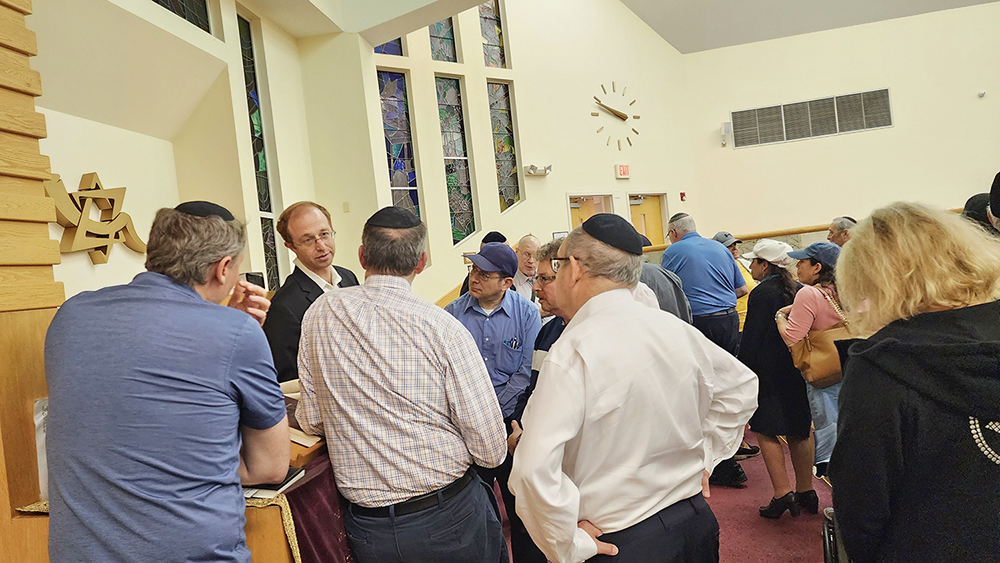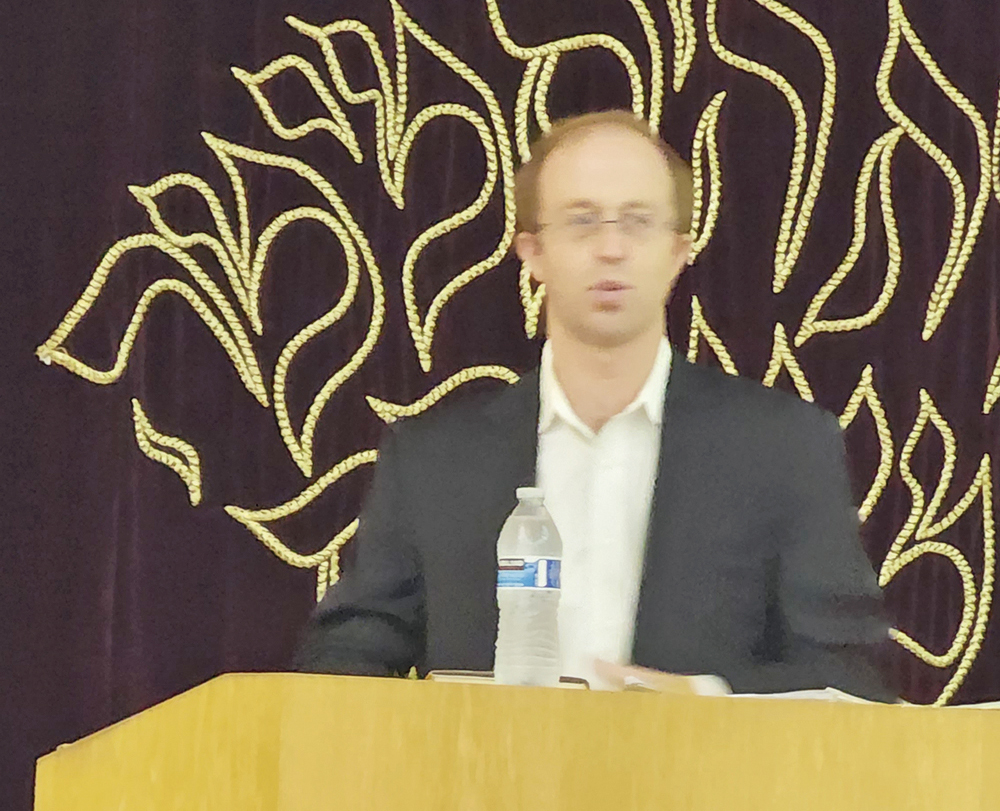
Approximately 300 people went to Congregation Ohr Torah in Edison to hear Yonah Jeremy Bob, senior military correspondent, intelligence analyst and literary editor at the Jerusalem Post, give a special and timely lecture on Saturday evening, October 28.
No matter how many 24-hour news channels there are, many in attendance came to hear the singular perspective that a journalist covering the Israeli military, the Mossad, the Shin Bet, defense technologies, cyber war and war crimes allegations would bring.
“The situation in Israel is the top concern for all of us. Many of us have children and relatives there, but we are all connected. I came to get a better understanding about the current situation,” said Edison’s Naomi Caplan.
Event organizer Mitch Rottenstreich opened the talk by saying that Bob’s speaking engagement was booked six months ago and was primarily planned to introduce the journalist’s recently published book “Target Tehran: How Israel Is Using Sabotage, Cyberwarfare, Assassination—and Secret Diplomacy—to Stop a Nuclear Iran and Create a New Middle East.” Rather than focusing solely on the book, the author provided information, background and perspective to the current situation and events brought about from Hamas’ massive terrorist attack on Israel on October 7 and Iran’s role in the region.
Bob began his presentation noting that about 80% of his new book is current and noteworthy as part of today’s news—covering the theft of Iranian nuclear secrets in 2018 and the incredible operation that consisted of the removal of several bookcases of original material.

Interactions, cooperation and relationships among countries in the region, along with global entities with local interests, were reviewed. Intelligence information shared between the United States and Israel contributed to the assassination of Iranian nuclear scientists in 2020 and Sunni Arab states cooperating with Israel against the Shiite Muslims in Iran were just two examples.
Bob called the Hamas strike on October 7 the “worst intelligence failure since the Yom Kippur War.” Hubris and low assumptions of Hamas capabilities led to the arrogance in the intelligence communities that did not take the enemy seriously. Plans were made to counteract most-likely enemy events, “but they failed to plan for the less likely scenarios,” leading to a situation analogous to 1973.
Israel was accustomed to “only” 50-100 rockets from Gaza over the course of any given day. On October 7, there were 2,000 rockets fired simultaneously. Drones took out security installations and cameras, while difficult-to-detect hang gliders dropped into sensitive areas and fence incursions at 27 different locations. The worst-case scenario Israel had planned for was a possible Hamas takeover of two villages. “They would never have guessed that 3,000 Hamas fighters would flood the region,” Bob said. “There were strategic and tactical failures that led to this tragedy.”
Most Israelis have become accustomed to attacks near the Gazan border. The massacre at the music festival galvanized the country, with victims hailing from cities, small towns and suburbs across the nation and the world.
Current and varied use of Israeli marine and ground troops, in addition to air strikes against Gaza, have been designed to throw off the enemy as to what the next steps will be. Israeli military commanders wanted to strike northern Gaza in the first week of the war, but particularly after President Biden’s visit, political decisions postponed the offensive. Despite whatever military strength Israel has, “it is clear they are losing the global public relations war as Palestinian civilians are impacted,” the journalist said. “Hamas got lucky and they had their moment. The question is whether Israel has the will to go deep enough into Gaza while simultaneously fighting the war of world opinion.” The tunnels in Gaza hide many of the Hamas fighters; others merge with the civilian population; and others seek refuge in hospitals, schools and community centers. Eliminating the Hamas framework will be difficult, Bob shared.
The anticipation of a guerilla war in Gaza may weaken the Israeli will to eliminate Hamas. Large number of Israeli casualties will devastate the nation, Bob noted, adding that even if Gaza and Hamas are completely destroyed, the question remains about who will then be in charge of that area. Would it be the Palestinian Authority? They would not be able to withstand a reemergence of Hamas. With many Hamas fighters assimilating into the general population and posing as civilians, they will emerge at some point to regain power. Would control go to the United Nations? That wasn’t successful in Lebanon, and would unlikely work in Gaza. Could the United States oversee the area? That would be highly unlikely given their experience in Iraq and Afghanistan.

The author reflected that perhaps hybrid oversight by the PA, local residents and the United Nations may work. There could possibly be added oversight by moderate Sunni Muslim countries that claim to care about the Palestinians.
He continued to say that whoever takes control, another jihadist group will take over at some point. The question is whether hybrid oversight could be strong enough to hold off another attack.
At this point, Israel is hoping a second military front does not fully expand in the north. Hezbollah is creating some noise and military concern; civilians have been evacuated. But these skirmishes are not a surprise, and the hope is that there is no escalation. The Iron Dome protects Israel from about 90% of the guided rockets sent by Hezbollah; the concern is the 10% that do get through could cause major harm to Israeli population centers.
Bob ended his presentation by saying that Hamas couldn’t have pulled off the attack by itself. Training, money, supplies and planning had to come from the hands of Iran.
Israel is being tried in the court of world public opinion. The best thing we can do in the United States is connect with the people of Israel. The country is still in shock and mourning. Sending messages of support, posting flyers about the hostages, and financial support are all very important.
Judah Elbaum of Highland Park said he usually doesn’t come out to talks or shiurim, but this topic was too important to miss. Andrew Getraer, also from Highland Park, came to hear “more intimate and specific knowledge of the situation that isn’t presented in the media.”












